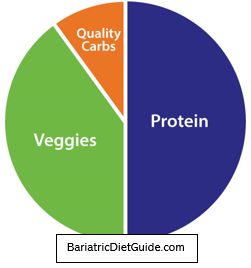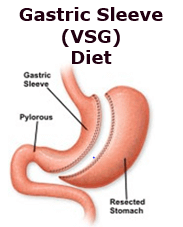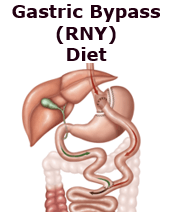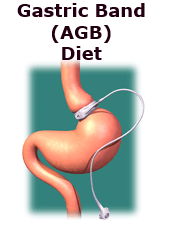- Home
- Lifelong
Bariatric Diet For Life
Make a Big Success of Your Tiny Tummy
If you’re at a loss as to what to eat on the bariatric diet for life, you’re not alone. Most all you ever hear about a bariatric diet is to eat your protein, protein, protein. That's good advice while you’re on the post op diet recovering, and while you're in the "honeymoon" weight loss phase. But beyond that, not so much.
There’s nothing magical about eating endless amounts of protein that will make you lose weight. If you find you’re always grabbing for something that has protein because you’re worried you’re going to fall short, you may ultimately be slowing your weight loss or even worse…causing weight gain. Too much protein = too many calories.
Bottom Line: Calories Matter
A smaller stomach should theoretically make you eat fewer calories. But it IS possible to outsmart the notion of a tiny tummy by:
- Eating too often
- Eating the wrong texture
- Drinking your calories
- Feeding Emotional Hunger
- Eating slider foods
Note: Not drinking enough water or other calorie free beverages every day makes a difference too. When you don't drink enough fluid, you feel more hungry. When you feel hungry, you eat! Eating more often = more calories. Bottom line: drinking at least 64oz of fluid every day controls your hunger.
So How Many Calories on the Bariatric Diet for Life?
Many surgery practices recommend keeping calories on the lifelong bariatric diet at 800-1200 per day to prevent weight regain.
1200 Calorie Bariatric Diet Example
That being said, my hope for you is that you don’t have to be on a diet following a calorie goal for the rest of your life after your procedure. I’m guessing you went down that path before you ever had surgery. Possibly multiple times.
Meticulous calorie counting shouldn’t be necessary once you’ve had your stomach surgically reduced! Besides, focusing on calories only, doesn’t help you choose healthy, nutrient rich foods...(low calorie ice cream is still ice cream!)...
…nor does it guarantee a healthy pattern of eating.
The answer?
Choose the right healthful foods- vegetables, fruits, lean proteins, quality carbs, small amounts of healthy fat- and strive to eat mindfully. Bariatric diet calories will then take care of themselves. The quality of calories matters more than the quantity. The quality of calories will help reduce the quantity of calories naturally.
Remember when you signed up for surgery and were excited about overhauling your diet and making a complete lifestyle change? Well now's the chance! Here are some simple, healthful breakfast ideas and lunches to get you started eating quality foods.
Bottom Line:
Learning to choose quality calories (quality foods) is more important than learning to count calories. There’s no cookie cutter answer to “how many calories should I be eating” on the bariatric diet for life anyway! It ultimately depends on several factors:
- Gender
- Height
- Weight
- Age
- Activity level (or lack of)
Protein on the Bariatric Diet for Life

While protein is an important part of your bariatric diet for life....and an important component of any healthy diet, you don’t necessarily need a lot more protein than you would have otherwise needed without surgery.
But, with a smaller stomach, the protein takes up a larger percentage of the meal and there’s less room for other foods.
Like calorie needs, protein needs are different for each person depending on activity level, body composition, etc. As a general rule, 60 grams of protein per day covers most people’s daily needs.
While protein shakes are essential in the beginning, work toward eating real whole foods sources of protein on the bariatric diet for life. Texture matters.
You won't be able to eat as much of something that's solid and dense (chicken) as you will something soft, mushy, or liquid (protein shake). Liquids and mushy foods will also pass out of the stomach faster than solids, thereby causing you to feel hungry sooner. More hunger = go looking for food = eat more food = more calories. There's that calorie concept!
Processed, packaged “high protein” foods like protein chips, protein pretzels, protein cereal do NOT count as real, whole foods, sorry. Despite having protein, these processed foods are “slider foods" and are waayyyy too easy to overeat. Translation...too many calories! There it is again.
Carbs on the Bariatric Diet for Life
It’s an urban myth that you can’t eat carbohydrates after weight loss surgery. Totally not true! Ditch the “carbophobia.” Get the real truth about bariatric carbs per day.
By default, carb intake is low in the beginning because eating protein is a priority and there’s not very much room in your stomach. So carbs are pushed aside. See this bariatric carb chart.
But over time, your appetite increases a little, you can eat a little more, and there’s room to fit in some carbs. However, all carbs aren't created equally. The carbs in black beans are different than the carbs in jelly beans!
Eating quality carbs is more important than counting carbs or trying to avoid them altogether. Same concept as quality calories.
There are a lot of good-for-you foods that are high carb- like vegetables, fruits, beans, oatmeal, sweet potatoes, and quinoa. There’s no reason why you can’t include these healthful carbs on your bariatric diet for life. You can even use fruits and veggie as carb swaps!
Portion Sizes on the Bariatric Diet for Life
There’s no evidence to support what volume of food you “should” eat at any given time after surgery. Super frustrating, I know!
There’s a lot of misinformation floating around that says your stomach “only holds” X amount. Truly, how much your stomach can hold is related to:
- How far out of surgery you are
- Which surgery you have (how big your pouch is)
- Texture of the food you’re trying to eat
Get all the facts about portion sizes here.
Small bariatric portion sizes are easy if you have the right tools, tips and techniques to do so!
Your stomach is the only true thing that can tell you how much to eat. That’s why mindful eating is the single most important skill to master as you follow the bariatric diet for life.
How to Stay Motivated
Have LOTS of good go-to recipes on hand!
Use a Body Measurement Tracker
- Often when the scale isn't moving, inches are. By consistently measuring and recording your measurements, you can see how your body is changing and how your efforts are paying off, even when it doesn't appear so on the scale! Pick from one of my free printable body measurement tracker templates.
Top 5 Tips to Stay Motivated Long Term
- Bariatric surgery does't FORCE the lifestyle changes that must follow, although you may think it will. Inevitably, motivation starts to wane over time. Trust me, I see it over and over and over.
- I always suggest thinking through how you'll stay motivated before you ever even have surgery so you have a good plan in place. However, if you missed that step, its ok....there's no time like present. How to Stay Motivated Long Term.
- There's nothing like accountability to keep you on track!
FAQs
The Bottom Line for Your Bottom Line
Bariatric Diet for Life: Fundamental Principles for Success
- Structure your eating: Eat at regular, planned meal times. No grazing. Eating too often = too many calories.
- Eat solid, dense healthful foods, not mushy stuff and protein shakes.
- You can't out train a bad diet. Diet vs Exercise After Bariatric Surgery:The Real Hero
- Drink at least 64oz daily of calorie free beverages. Use top tips to avoid dehydration.
- Learn how to eat quality foods using easy menu ideas. Calories and portions fall into line when you pick the right foods.
- Learn about the right portion sizes and use the right portion tools.
- Have a plan to how you will stay motivated long term!


